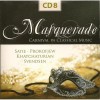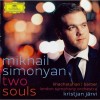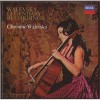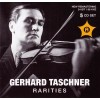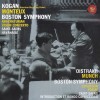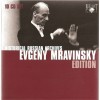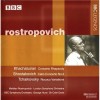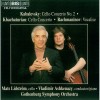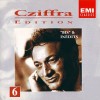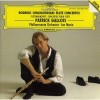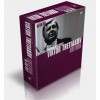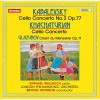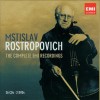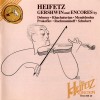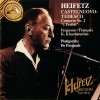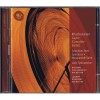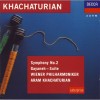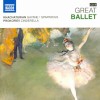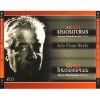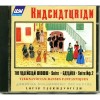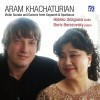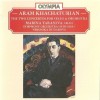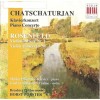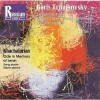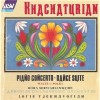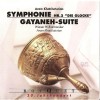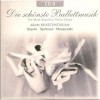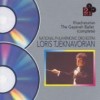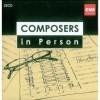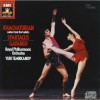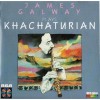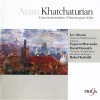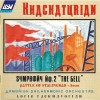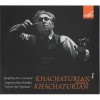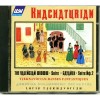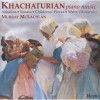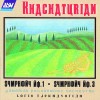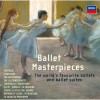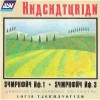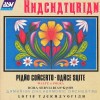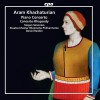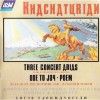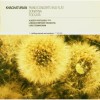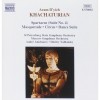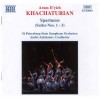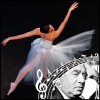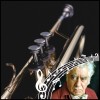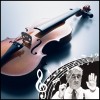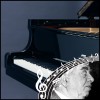Biography
Aram Ilyich Khachaturian (Armenian: Արամ Խաչատրյան; Russian: Ара́м Ильи́ч Хачатуря́н; June 6, 1903 – May 1, 1978) (born in Tiflis, Georgia) was a prominent Soviet Armenian composer. Khachaturian's works were often influenced by folk music of Armenia.
Life
Aram Ilyich Khachaturian was born in Tiflis, Imperial Russia (now Tbilisi, Georgia) to a poor Armenian family. In his youth, he was fascinated by the music he heard around him, but at first he did not study music or learn to read it.
In 1920, when Armenia was declared a Soviet republic, Khachaturian joined a propaganda train touring Armenia, populated by Georgian-Armenian artists. The following year he travelled to Moscow to join his brother, the stage director of the Second Moscow Art Theatre. Although he had almost no musical education, Khachaturian showed such great talent that he was admitted to the Gnessin Institute where he studied cello under Sergey Bychkov, and later Andrey Borysyak. In 1925 Mikhail Gnessin started a composition class at the Gnessin Institute which Khachaturian joined.
In 1929, he transferred to the Moscow Conservatory where he studied under Nikolai Myaskovsky (composition) and Sergei Vasilenko (orchestration), graduating in 1934. In the 1930s, he married the composer Nina Makarova, a fellow student from Myaskovsky’s class. In 1951, he became professor at the Gnessin State Musical and Pedagogical Institute (Moscow) and the Moscow Conservatory. He also held important posts at the Composers' Union, becoming deputy chairman of the Moscow branch in 1937, then appointed vice-chairman of the Organizing Committee of Soviet Composers in 1939. In 1939 he composed his ballet Happiness, which was later reworked into the ballet Gayane.
The composer joined the Communist Party of the Soviet Union in 1943. However, he temporarily fell from official favour in 1948. It was the Symphonic Poem, later titled the Third Symphony, that officially earned Khachaturian the wrath of the Party. Ironically, Khachaturian wrote the work as a tribute to communism: “I wanted to write the kind of composition in which the public would feel my unwritten program without an announcement. I wanted this work to express the Soviet people’s joy and pride in their great and mighty country.” Perhaps because Khachaturian did not include a dedication or program notes, his intentions backfired.
Andrei Zhdanov, secretary of the Communist Party’s Central Committee, delivered the so-called Zhdanov decree in 1948. The decree condemned Shostakovich, Prokofiev, Khachaturian, and other Soviet composers as “formalist” and “anti-popular.” The three named composers had by then already become established as the so-called "titans" of Soviet music, enjoying worldwide reputation as some of the leading composers of the 20th century. Nonetheless, all three accused composers were forced to apologize publicly.
The decree affected Khachaturian profoundly: “Those were tragic days for me... I was clouted on the head so unjustly. My repenting speech at the First Congress was insincere. I was crushed, destroyed. I seriously considered changing professions.”
Despite this mortifying episode, Khachaturian returned to official favour. He received numerous state awards both before and after the Zhdanov decree: for example, four Stalin prizes (1941, 1943, 1946 and 1950), one Lenin prize (1959), a USSR State Prize (1971), and the title of Hero of Socialist Labor (1973). Khachaturian went on to serve again as Secretary of the Board of the Composers' Union, starting in 1957,[6][7][8] and was also a deputy in the fifth Supreme Soviet of the Soviet Union (1958–1962).
Khachaturian died in Moscow on May 1, 1978, just short of his 75th birthday. He was buried in Yerevan, Armenia, along with other distinguished Armenians who made Armenian art accessible for the whole world. In 1998, he was honored by appearing on Armenian paper money (50 dram).
Music
Khachaturian's works include concertos for violin (sometimes heard in a composer-sanctioned arrangement for flute), cello and piano as well as concerto-rhapsodies for the same instruments. These three concertos were written for the members of a renowned Soviet piano trio that performed together from 1941 until 1963: David Oistrakh, violin; Sviatoslav Knushevitsky, cello; Lev Oborin, piano. The piano concerto originally included an early part for the flexatone, and was his first work to gain him recognition in the West. Khachaturians's three symphonies are varied works, with the third containing parts for fifteen additional trumpets and organ. The composer's largest scaled works are the ballets Spartacus and Gayane, both of which contain Khachaturian's most well-known music, with Gayane featuring in its final act what is easily his most famous music, the "Sabre Dance".
He also wrote several solo piano works, including the Toccata in E-flat minor, and two albums of music for children (Opp. 62 and 100). Children's Album, Book 1, first published in 1947, contains a smooth and melodic Andantino originally composed in 1926; this piece is commonly known as Ivan Sings, which stems from eight of ten pieces originally being collected as Adventures of Ivan. Children's Album, Book 2, first published in 1964, includes a fugue composed in 1928, and a fast-paced programmatic piece entitled Two Funny Aunties Argued which is sometimes translated as Two Ladies Gossiping. He also composed some film music and incidental music for plays such as the 1941 production of Mikhail Lermontov’s Masquerade, the orchestral suite of which has become relatively popular.
The cinematic quality of his music for Spartacus was clearly seen when the Adagio of Spartacus and Phrygia was used as the theme for a popular BBC drama series, The Onedin Line, during the 1970s. Since then, it has become one of the most popular of all classical pieces for UK audiences. Joel Coen's The Hudsucker Proxy also prominently featured music from Spartacus and Gayane (the "Sabre Dance" included). Gayane's adagio was used in Stanley Kubrick's film 2001: A Space Odyssey among other films. He was also the composer for the state anthem of the Armenian Soviet Socialist Republic, whose tune is one of the five current choices to become the next state anthem of Armenia. The climax of Spartacus was also used in Caligula (film) and Ice Age: The Meltdown.





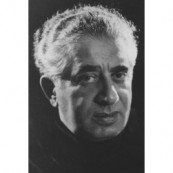

![Russian legends - Mstislav Rostropovich [10 CD]](http://static.classicalm.com/repository/collection-cover/small/275-img1319023256353734.jpg)

![Russian legends - Leonid Kogan [10 CD]](http://static.classicalm.com/repository/collection-cover/small/269-img1318707830156876.jpg)
![Russian legends - Viktor Tretiakov [6 CD]](http://static.classicalm.com/repository/collection-cover/small/271-img1318800770253179.jpg)

![Deutsche Grammophon Classic Gold [CD 2 of 3]](http://static.classicalm.com/repository/collection-cover/small/1315-img1361382127512512.jpg)

